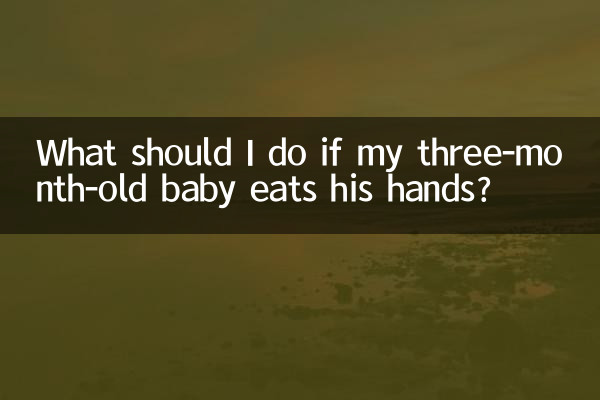What should I do if my three-month-old baby eats his hands?
Recently, topics about the behavioral habits of infants and young children have aroused heated discussions on major parenting forums and social media, especially the phenomenon of "three-month-old babies eating their hands." Many new parents are confused about this and don't know whether to intervene or how to guide it correctly. This article will provide you with structured analysis and practical suggestions based on popular discussions across the Internet in the past 10 days.
Analysis of common reasons for 1. Three-month-old babies to eat their hands

According to pediatric experts and parenting bloggers, the main reasons for three-month-old babies to eat their hands are as follows:
| Reason type | Proportion | Description |
|---|---|---|
| Explore the world | 45% | Normal performance during the oral stage, sensing objects through the mouth |
| hunger signal | 30% | It may be a sign that you need to eat |
| self soothe | 15% | Ways to relieve anxiety or fatigue |
| Pre-teething | 10% | Early signs of gum discomfort |
2. Criteria for judging whether intervention is needed
According to the latest parenting guidelines and expert advice, whether intervention is needed mainly considers the following factors:
| Observation indicators | normal range | Need to pay attention to the situation |
|---|---|---|
| Frequency | 3-5 times a day | Eat hands almost all day |
| duration | 5-10 minutes each time | Lasts more than 30 minutes |
| accompanying symptoms | None | Crying, refusing to eat, etc. |
| skin condition | normal | Redness, swelling, and broken skin appear |
3. Scientific response strategies
Based on recent popular parenting content, we have compiled the following widely recognized coping methods:
1.Satisfy exploration needs: Provide a safe teether or comfort pad to replace the tactile stimulation of fingers.
2.Feed regularly: Make sure your baby eats on time and avoid frequent hand eating due to hunger.
3.Increase interaction: Diversion of attention through parent-child games and touch massage.
4.Moderate cleaning: Keep your hands clean, but avoid excessive disinfection that may affect your immunity.
5.environmental observation: Pay attention to any stressors that may cause your baby to need extra soothing.
4. Ranking list of common misunderstandings among parents
Based on the discussion in the past 10 days, we have compiled the most common misunderstandings among parents:
| Misunderstanding | Discussion popularity |
|---|---|
| forcibly stop | ★★★★★ |
| use bitters | ★★★★ |
| Glove restrictions | ★★★ |
| Over-disinfection | ★★ |
| Worrying about addiction too early | ★ |
5. Timetable suggested by experts
Many parenting experts have given staged suggestions in recent live broadcasts and articles:
| age in months | Development characteristics | Recommended actions |
|---|---|---|
| 3-4 months | Oral phase begins | Provide safe item exploration |
| 5-6 months | Hand-eye coordination development | Guided grasping toys |
| 7-8 months | teething period | Give teeth grinding tools |
| 9 months+ | Refined movements | Develop other ways to soothe |
6. Special reminder
Recently, some experts have emphasized that during the flu season, attention should be paid to baby's hand hygiene, but there is no need to completely prohibit eating hands because of fear of germs. The correct approach is:
1. Caregivers wash hands frequently
2. Clean baby toys regularly
3. Keep your home environment tidy
4. Avoid contact with sick people
Remember, hand-feeding in three-month-old babies is a common phenomenon during normal development and does not require excessive intervention in most cases. What parents should do is to provide a safe environment and appropriate guidance, rather than forceful restraint. If it is accompanied by other abnormal symptoms or lasts for a long time, it is recommended to consult a pediatrician.
The content of this article combines recent hot discussions and authoritative guidelines in the field of parenting, hoping to help parents view and deal with the problem of babies biting their hands more scientifically. Every baby has its own pace of development, and patient observation and appropriate guidance are the key.

check the details

check the details